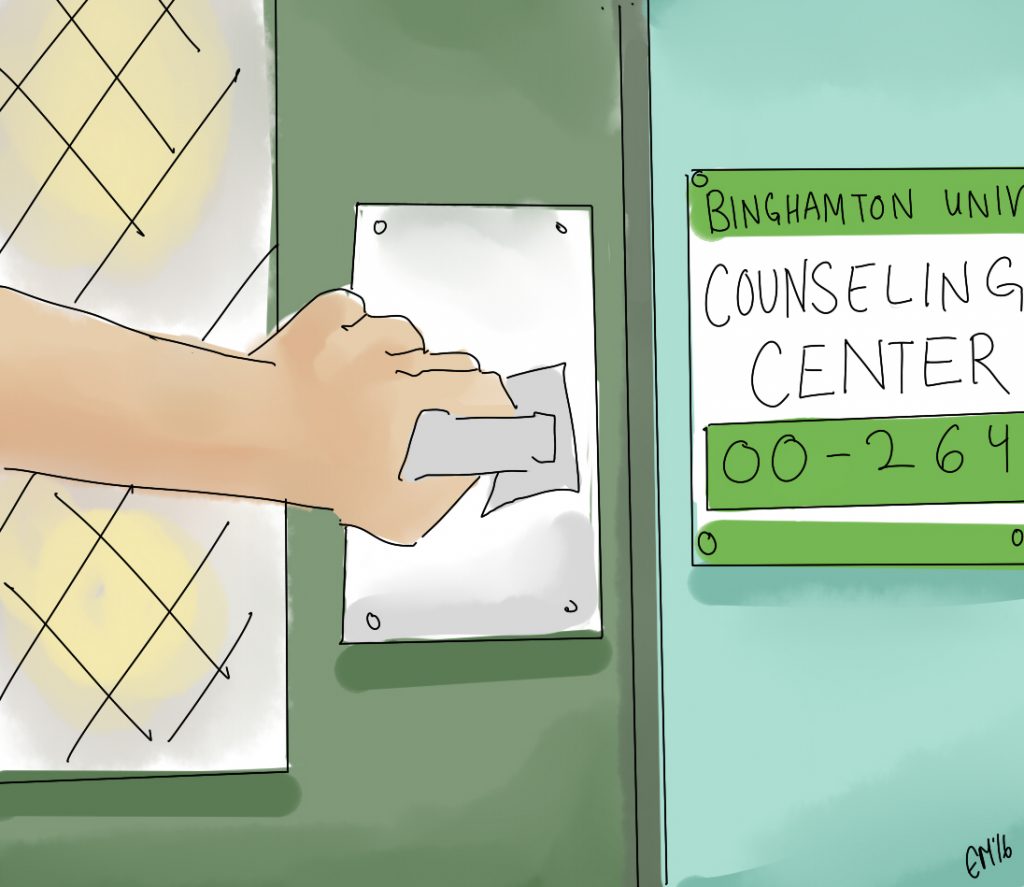
The month of October has been established as Domestic Violence Awareness Month. Domestic violence is best understood as a pattern of abusive behaviors used by one intimate partner against another, to frighten or manipulate in order to maintain control in a relationship. Even if you are not directly a victim of domestic violence, you may know someone who has been affected. Seeking help for yourself or someone else can be scary, but for those in need, there are plenty of resources available both on and off campus.
High Hopes Helpline
The High Hopes Helpline is a student-run phone service that allows students to call the helpline and express their concerns or problems. They can provide support whether the situation is related to domestic violence, stress, breakups, death or any other pressing issue. Those in need of assistance dealing with domestic violence can call the High Hopes Helpline and know that trained Binghamton University students who volunteer will listen to them. This is a private service that is brought to the University through collaboration with the Student Association and the University Counseling Center. If they believe you or someone else’s safety is at risk, the helpline will need to report to the supervisor of the helpline. It is then up to the supervisor to decide what steps will come next. They also will only report what is shared, so the individual is allowed to leave information out such as people’s names or specific places.
The High Hopes Helpline is open every day from 8 p.m. to 11 p.m. To reach the helpline, call 607-777-4357.
University Counseling Center
The University Counseling Center (UCC) provides an outlet to express one’s concerns with personal domestic violence or discuss personal experiences with the issue. Individual counseling and therapy sessions are available, as well as group counseling so that individuals can hear from other students who have had similar experiences. Additionally, the UCC operates an Interpersonal Violence Prevention program, which is a comprehensive program that focuses on victims of sexual violence, stalking or bullying. All patient records within the Center are confidential and will not be released to anyone, including parents and legal guardians. If there is potential that an individual will cause harm to oneself or another, there will be a clinical judgment made to release information.
The UCC can be reached at 607-777-2772.
Dean of Students
The Dean of Students can provide case management services. Within the Dean of Students staff, Doris Cheung specializes as the case manager for those involved in domestic violence issues. She emphasizes that the information with not be spread around, and will only be told to the Title IX coordinator in order for the school to take precautions to ensure that the school remains safe for everyone. If an individual is seeking help through the Dean of Students, know that someone will be able to explore options and find resources that will be best tailored to your situation based on your current needs.
The Dean of Students office can be reached at 607-777-2804.
University Ombudsman
The office of the ombudsman is a place where students can go to receive independent, informal and impartial assistance. The office does not keep any records identifying visitors and it is an ideal source to go to when you are unsure of where to go or how to proceed with getting help when dealing with domestic violence. The University ombudsman is a confidential resource, and is not obligated to tell the Title IX coordinator anything that is shared by the student. The office is committed to fairness and equal treatment to all that come to receive their assistance.
The University ombudsman can be reached at 607-777-2388.
Crime Victims Assistance Center
The Crime Victims Assistance Center is located on the East Side of the city of Binghamton and provides services for people who have been affected by any crime, including domestic violence. The center provides a crisis hotline, free counseling and education to both primary and secondary victims of crime, and can also assist with legal issues related to crime victims compensation. The center works with community members directly, but also serves the area hospitals and local police forces.
To reach them, call 607-723-3200.


